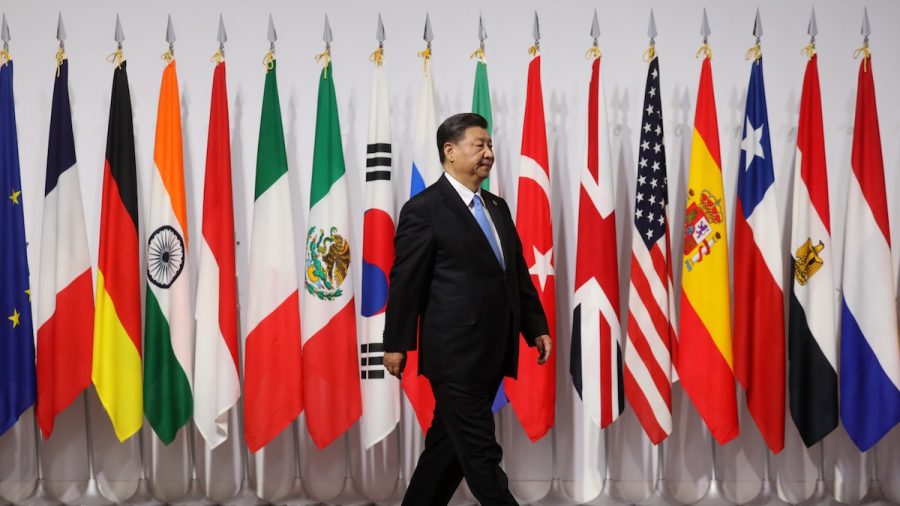Chinese leader Xi Jinping delivered a speech at the G-20 summit in Osaka, Japan on June 28, in which he made promises that the Chinese regime would further open up its economy.
The more conciliatory tone contrasted with the anti-U.S. propaganda that Chinese state media has published in recent weeks.
But Xi also made comments at a sideline G-20 meeting with BRICS nations in which he lamented that certain developed countries are engaging in “protectionism” that “overshadows the peace and stability worldwide,” according to Reuters, in a veiled reference to the United States.
Xi will have a sideline meeting with U.S. President Donald Trump at 11:30 a.m. local time on June 29. Because the U.S.-China trade dispute has had major repercussions for the global economy, the Trump-Xi meeting has become a focus of the world.
White House economic adviser Larry Kudlow said in a June 27 interview with Fox News that Trump was optimistic about the outcome. “President Trump looks forward to the meeting. We believe it’s quite possible if the meeting goes well that the Chinese will come back to the negotiating table.”
Xi’s Speech
Xi spoke to all state leaders who attended the G-20 summit on Friday.
In his speech, Xi announced five initiatives that the Chinese regime would take.
He promised to open up Chinese markets further and increase foreign imports, adding that Beijing would seek to lower tariff rates on imports, according to Chinese state-run media Xinhua. These are demands that U.S. negotiators had previously made during talks.
He also promised to give all China-registered businesses fair treatment and work to remove barriers to entry into the Chinese market.
It should be noted that foreign firms that operate in China are often not registered in China.
Xi also said Beijing would promote trade agreements, including a China-Europe agreement and a China-Japan-South Korea one. The United States has been pursuing similar bilateral agreements with those countries, including a deal signed in July last year with the European Union widely seen as a joint effort to counteract China.
The Chinese leader also emphasized in his remarks that the Chinese economy was operating very well.
A Fatal Blow
But Chinese scholars have said otherwise.
Yu Yongding, a scholar at the state-run research institute Chinese Academy of Social Sciences, said at an event held at the Renmin University of China on June 26 that the U.S.-China trade dispute had greatly impacted China’s economy, adding that the U.S. export ban on several Chinese high-tech firms will prove to be a fatal blow.
Taiwanese news agency CNA reported that Yu quoted a report by UBS, which surveyed 450 foreign-invested companies in China. 82 percent said they were preparing to move or has already moved their factories out of China.
Yu explained that after U.S. authorities increased tariffs on Chinese goods, the majority of foreign companies made plans to move 20 to 60 percent of their production out of China, in 2020 and 2021. Most of these businesses are in the medicine and information technology (IT) sectors.
The U.S. Department of Commerce recently placed an export ban on Chinese tech giant Huawei and five supercomputer firms, citing national security risks in having U.S. suppliers do business with them.
Yu said this move would make it hard for Chinese high-tech companies to survive, as many of them depend on U.S. components and technology.
He analyzed that China has three potential solutions: decouple from the global supply chain and do everything by itself; embrace the global supply chain actively; or prepare alternatives to replace American technologies.
The third option would not work because it is impossible to develop the technologies in a short time, he said. For the second, it would depend on other countries to embrace China. Meanwhile, the first option is difficult to achieve.
Yu addressed the potential for U.S. authorities to enact financial sanctions, which would be devastating to the Chinese economy because all Chinese banks rely on the U.S.-supplied international banking system, he said.
From The Epoch Times


